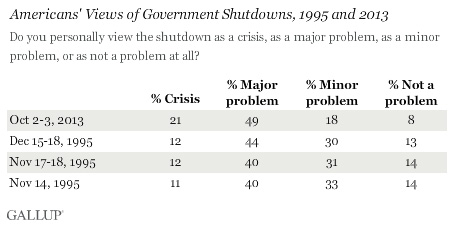Even government shutdowns were better in the '90s
At least Clinton and Gingrich were talking

The first government shutdown in 17 years drags on, and people are getting sick of it.
The poll numbers released this week are nothing short of stunning. In an Associated Press-GfK poll, Congress got an absurd five percent approval rating. Meanwhile, Gallup took a trip down memory lane, comparing the current shutdown to the one in 1995-96 — and despite the ubiquity of Hootie and the Blowfish, Americans were more optimistic about the situation in the '90s than they are now:

Not only do more people think we're in a crisis now, they are also more critical of Washington. Today, 57 percent of Americans think worse of President Barack Obama because of his leadership during the shutdown, compared to only 49 percent who thought the same of President Bill Clinton.
Subscribe to The Week
Escape your echo chamber. Get the facts behind the news, plus analysis from multiple perspectives.

Sign up for The Week's Free Newsletters
From our morning news briefing to a weekly Good News Newsletter, get the best of The Week delivered directly to your inbox.
From our morning news briefing to a weekly Good News Newsletter, get the best of The Week delivered directly to your inbox.
Congressional lawmakers are hardly off the hook. Today, 61 percent of Americans view the "Republican leaders in Congress" more negatively because of the government shutdown, about the same percentage as in 1995.
That's no reason for the GOP to bust out the champagne. The current approval rating for the Republican Party is 28 percent — the worst number for either party since Gallup began recording such information in 1992.
Is the situation really this dire? Are the American people, with their memories of Michael Jordan and $1.06 gas, simply forgetting how bad 1995-96 was?
The sad truth is that Washington is far more dysfunctional now. Here is former House Speaker Newt Gingrich (R-Ga.) recounting his relationship with Clinton:
Sign up for Today's Best Articles in your inbox
A free daily email with the biggest news stories of the day – and the best features from TheWeek.com
Bill Clinton and I would talk, if not every day...we would talk five days a week before the shutdown, after the shutdowns. We met face to face for 35 days in the White House trying to hammer things out. When you get to know somebody, even when you're fighting hard, you kind of understand where the other person is coming from and they're not some demonized figure. [CNN]
It is hard to imagine a similar relationship developing between President Obama and House Speaker John Boehner (R-Ohio), who unlike Gingrich does not speak for his whole caucus. Even if Boehner wanted to strike a deal with Obama, he would have to sell it to the Tea Party, an extremist wing Gingrich didn't have to worry about because Republicans represented much more moderate districts in 1995.
Back then, Republicans actually had to worry about being challenged by a Democrat, as opposed to today's polarized climate in which losing your job is only a compromise and a primary away. Hence the GOP's willingness to defund the government — and even send the U.S. into default.
This is all taking place in the aftermath of one of the worst recessions in American history. In 1995, the United States was in the middle of an economic boom, while today's economy is stagnant.
"This isn't to say that a government shutdown is unprecedented," The Daily Beast's Daniel Gross argues. "But a government shutdown in an economy that looks like today's economy is unprecedented."
The U.S. economy and Washington's reputation recovered after the last shutdown. It's not clear that the same is going to happen after this one.
Keith Wagstaff is a staff writer at TheWeek.com covering politics and current events. He has previously written for such publications as TIME, Details, VICE, and the Village Voice.
-
 Today's political cartoons - May 10, 2025
Today's political cartoons - May 10, 2025Cartoons Saturday's cartoons - artificial intelligence, cryptocurrency, and more
-
 5 streetwise cartoons about defunding PBS
5 streetwise cartoons about defunding PBSCartoons Artists take on immigrant puppets, defense spending, and more
-
 Dark chocolate macadamia cookies recipe
Dark chocolate macadamia cookies recipeThe Week Recommends These one-bowl cookies will melt in your mouth
-
 The JFK files: the truth at last?
The JFK files: the truth at last?In The Spotlight More than 64,000 previously classified documents relating the 1963 assassination of John F. Kennedy have been released by the Trump administration
-
 'Seriously, not literally': how should the world take Donald Trump?
'Seriously, not literally': how should the world take Donald Trump?Today's big question White House rhetoric and reality look likely to become increasingly blurred
-
 Will Trump's 'madman' strategy pay off?
Will Trump's 'madman' strategy pay off?Today's Big Question Incoming US president likes to seem unpredictable but, this time round, world leaders could be wise to his playbook
-
 Democrats vs. Republicans: who are the billionaires backing?
Democrats vs. Republicans: who are the billionaires backing?The Explainer Younger tech titans join 'boys' club throwing money and support' behind President Trump, while older plutocrats quietly rebuke new administration
-
 US election: where things stand with one week to go
US election: where things stand with one week to goThe Explainer Harris' lead in the polls has been narrowing in Trump's favour, but her campaign remains 'cautiously optimistic'
-
 Is Trump okay?
Is Trump okay?Today's Big Question Former president's mental fitness and alleged cognitive decline firmly back in the spotlight after 'bizarre' town hall event
-
 The life and times of Kamala Harris
The life and times of Kamala HarrisThe Explainer The vice-president is narrowly leading the race to become the next US president. How did she get to where she is now?
-
 Will 'weirdly civil' VP debate move dial in US election?
Will 'weirdly civil' VP debate move dial in US election?Today's Big Question 'Diametrically opposed' candidates showed 'a lot of commonality' on some issues, but offered competing visions for America's future and democracy